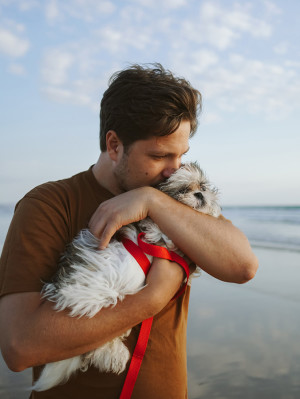Why Is Your Puppy Crying at Night?
Will you or your puppy ever get some sleep? Here is the help you’ve been looking for.

Share Article
In This Article:
Why Do Puppies Cry at Night? How Long Will My Puppy Cry at Night? When Should I Worry About My Puppy Crying at Night?
One of the most agonizing experiences for pet parents is also one of the first. It’s the heartbreak and uncertainty of what to do when your new puppy is whining, crying, and whimpering at night.
Dr. Aimee Warner, resident veterinarian at Waggelopens in new tab, recalls helping a couple through the agonizing first few nights with their tiny new Spaniel puppy. “As first-time pet owners, they told me how distressing it was, especially since it was the puppy’s first night at home, and she was surely missing her litter,” Warner recounts. “The husband and wife took turns curling up next to her crate, just to let her know she wasn’t alone. By reassuring their puppy that they were there, she gradually settled into the home and slowly learned her new sleeping space.”
Even if you’ve done it more than once, or if you have a multi-dog household, it never gets easier hearing your new puppy cry. Warner says puppies cry because they miss their mother and their littermates, and they’re adjusting to their new environment. “What you can do is place their crate near your room or by your bed to help reduce nighttime anxiety. This can make them feel secure so they can develop healthy sleeping habits,” she says.

Why do puppies cry at night?
Paige Gordon, a professional dog trainer with SpiritDog Trainingopens in new tab, says new puppies are going through a lot. “A new puppy cries at night due to separation anxiety or loneliness, as they have usually been through many changes in a short time, going from living with their mother and siblings to a new space without everything they’re accustomed to.”
Boredom
A bored puppy is one who has trouble settling down at night, and can be destructive. Puppies expend energy in short bursts throughout the day. Providing mental and physical stimulation at corresponding intervals will ensure your pup has had all the activity and engagement they need (with no excess energy) for a quiet night.
Loneliness
Going back to experts’ observation that puppies cry at night because they no longer have the comfort and security of their littermates, it’s reasonable to expect them to cry because they’re lonely. Give your pup plenty of exercise and attention during the day, and place their crate near your bed to offset nighttime loneliness.
Separation anxiety
“Puppies with separation anxiety can cry for quite some time, usually until someone comes to check on them as they become more worked up,” Gordon says. Try to soothe your puppy with your voice, and let them out when there’s a pause in their crying.
Needing to go out
A puppy can hold their bladder about one hour for every month of age. If they are restless and crying, and it’s been longer than you can reasonably expect them to hold their bladder, take them out. “If your puppy has to go to the bathroom, they will likely carry on with crying in their crate at night until we either let them out or they are no longer able to hold it and relieve themselves in their crate,” Gordon says. “If your puppy is persisting with crying beyond a few little complaint cries, first try taking them out to the bathroom to see if they have to go.”
How long will my puppy cry in their crate at night?
Warner says adjusting to a crate routine should take no more than three weeks. “When initially presented to a crate, more often than not, puppies must acclimatize before they settle in for sleep. If they’ve never slept alone before, pet [parents] can expect that, at first, they will whine, but this will diminish within five nights.”
Warner advises empathy and consistency. “Remember that you’re not required to do an all-or-nothing approach,” she says. “Just like how you’re getting used to having a puppy at home, your pup is also going through a transition. There’s no one-size-fits-all solution. Do what works best for you, your puppy, and your lifestyle.”
How to soothe a crying puppy
To some, a puppy’s pitiful cries are worse than the sound of a crying baby. Try placing the crate near your bed for the first few nights, so your puppy can see you and hear the sound of your voice. “Having the crate or puppy sleep area in your own room can help to alleviate some of the separation anxiety your puppy may be struggling with,” Warner says.
Crate train your puppy.
A crate is like a pack-n-play or a crib for a baby. It keeps the puppy safe at night and, over time, becomes comfortable and familiar. It replicates the natural denning instinct (similar to a dog house), and it’s portable. It fosters a secure, independent pup less prone to clinginess. There are lots of great resources about crate training at Kinship, including a comprehensive, step-by-step guide to crate-training and crate-training your puppy at night.
Warner says to start by letting your puppy explore the crate, giving them toys and treats to make it comfortable. Leave them alone for a few minutes, and gradually build up to longer amounts of time, though never longer than they can be expected to hold their bladder.
Let them out before they cry. If they do start crying, wait until they pause to release them, or you risk teaching them they’ll be let out when they cry. Keep the experience positive, and never use the crate as punishment. “Be patient, and let them get familiarized with the crate, as a gradual approach can help them understand and associate it with a safe space,” Warner says.
Tire your puppy out before bed.
Make sure your puppy gets enough exercise, so they sleep soundly at night. “Trying to give them more mental and physical enrichment during the day, and give them something to help settle at bedtime, like a chew may be beneficial,” Gordon says.
Choose the right size crate.
Choose a crate that’s the right size for your puppy. If your puppy is going to grow a lot, section off part of a larger crate. “It should be cozy and inviting, but still roomy enough for them to stand up, turn around, and lie down comfortably,” Warner says.
Provide plenty of potty breaks.
Limit water within a couple of hours of bedtime, and take your puppy out just before you put them in the crate. Then set your alarm according to how long you think they can hold it: three hours for a three-month-old puppy, four hours for a four-month-old puppy, and so on. “Puppies have small bladders, and most of them will not be able to hold it through the night when we first bring them home,” Gordon says.
When should I worry about my puppy crying at night?
Warner says new pet parents need to remember that it’s normal for puppies to cry at night. “If it becomes persistent and escalates, then you notice they start vomiting or become lethargic, it might mean they have a medical issue that needs attention or they have severe anxiety,” she says. “If your puppy shows signs of distress, consult a canine behaviorist or a veterinarian at your earliest convenience. Trust your instincts and get your puppy the support it needs.”
FAQs
Why do puppies cry at night?
New puppies cry at night because they’re used to sleeping beside their littermates and are experiencing separation anxiety. Puppies also cry because they have a full bladder, they want attention, they’re bored, or they’re lonely.
How can I soothe my crying puppy?
Let your puppy out if it’s been a while since they’ve peed. If that’s not the reason they’re crying, place the crate near your bed to alleviate loneliness and separation anxiety.
How long does it take to crate train a puppy?
Crate training can take a week or up to a month, depending on the age of the dog. Once you get them comfortable in the crate with cozy bedding, toys, and treats, you can gradually increase the amount of time you leave them in the crate.
Is it cruel to make a puppy sleep in a crate?
When introduced gradually and consistently (and used correctly), a crate is a good method for keeping your puppy (and your home) safe. Crates teach independence and become a puppy’s refuge, but should never be used as punishment.
How many times a night should I let my puppy out?
The general rule of thumb is that a puppy can hold their bladder one hour for every month of age. If you have a three-month-old puppy, you should be letting them out every three hours.
What should I do if my puppy is still crying after three weeks?
Consult a canine behaviorist or a veterinarian if the crying doesn’t abate after three weeks. It might mean your puppy has a medical issue or severe anxiety.
References
Dog Behavior Tips. Regional Animal Services of King County. https://www.kingcounty.gov/~/media/depts/regional-animal-services/files/Guides-for-pets/DogBehaviorTips_RASKC.ashxopens in new tab.
How to Socialize and Habituate a Puppy, Part 2. Association of Pet Behavior Counselors & Diane Sullivan. www.cabq.gov/pets/documents/socialization_prt_2.pdfopens in new tab.
Santos, N. R., et al. “A Review of Maternal Behaviour in Dogs and Potential Areas for Further Research.” The Journal of Small Animal Practice, vol. 61, no. 2, 1 Feb. 2020, pp. 85–92, www.ncbi.nlm.nih.gov/pmc/articles/PMC7027574/, opens in new tabhttps://doi.org/10.1111/jsap.13085opens in new tab.
Separation Anxiety. Austin Animal Center Resource Library. www.austintexas.gov/sites/default/files/files/Animal_Services/Resource%20Library/AAC%20Separation%20Anxiety.pdf.opens in new tab

Catherine Fahy Green
Catherine Fahy Green is a journalist turned copy and content writer. As a pets writer, she focuses on and is fascinated by animal body language because there's so much to learn from and about animals by spending time in their presence and observing their physical cues.
Her work as a PR specialist appears in national trade media as press releases and stories about exciting new products people should try. She lives with her family in Western Massachusetts, where she listens closely to the stories her two dogs, flock of chickens, and four horses tell her. She spends her weekends at horse shows with her daughter.
Related articles
Why Does Your Puppy Chase His Tail?
And when to talk to the vet.
![Young man cuddling little white shih tzu puppy by the Atlantic Ocean.]()
9 Myths About Your Puppy—Busted By a Behaviorist
The internet has a lot to tell you about your new addition. Here’s what’s actually true.
When Can a Puppy Leave Their Mom?
Of course, you’re their parent, too. But they need their biological mom for as long as possible.
![a whining puppy]()
Why Is My Puppy Whining?
It’s the saddest sound in the world.
![Woman sitting on couch, frustrated with her small dog.]()
The “Puppy Blues” Are a Struggle for About Half of New Dog Parents, Study Finds
If you’re feeling stressed or sad after bringing home a young pup, you’re not alone.







